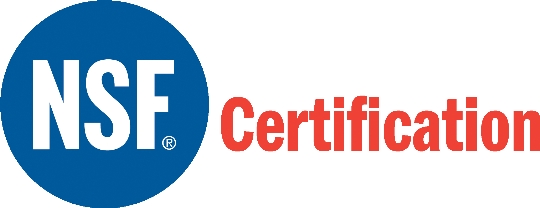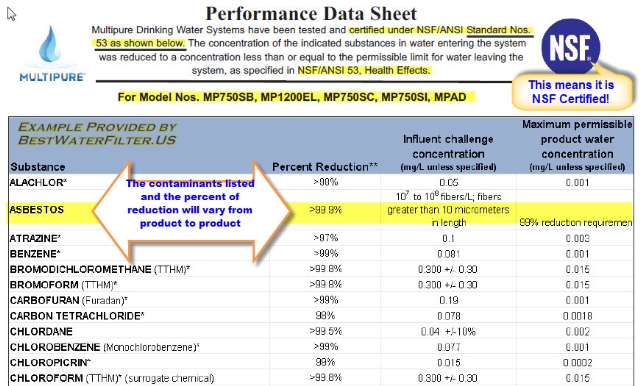NSF Certification Means Quality
The NSF is a non-profit organization that employs scientists to test, analyze and certify products such as water filters. Personally I would not buy any filter that is not NSF Certified because the NSF Certification is the one guarantee you have that the filter does what the manufacturer says it does.
If a filter is not NSF Certified you really have no real assurance at all that it will filter the contaminants listed on the box or data sheet.
Unfortunately any company can make a water filter and say it filters this and that, and there is no real enforcement or assurance that it is true unless the NSF or some other reliable and trusted non-profit organization verifies that it is. And as far as I know the NSF is the only organization that meets this criteria.
When you find a filter that is NSF Certified, however, it doesn't mean you should buy it based on that fact alone. Why not? Please bear with me while I explain 2 simple points, because you need to understand this before choosing a water filter.
The NSF has various "Standards" it certifies for. The 2 we are most interested in here are Standard 42 and Standard 53.
What does "Certified for Standard 42 and Standard 53" mean?
Now many water filters will tout that their filters are "NSF Certified" but when you look closely you will see they are only Certified for Standard 42.
Standard 42 refers only to "aesthetic effects" which means generally that it is certified only to reduce chlorine and chloramine which will make the water smell and taste better, while doing nothing to reduce the many contaminants such as lead, mercury, asbestos, radon, and so on!
The Standard that you need to be concerned with is NSF Standard 53. Standard 53 covers the contaminants listed above as well as dozens of others.
However, being certified for Standard 53 does not in and of itself mean that the water filter is good or worth buying.
Why is that?
Standard 53 varies according to which contaminants are included.
When the NSF issues its Performance Data sheet it lists not only that it is "Certified for Standard 53" but it lists which specific contaminants it has tested for and found the filter to actually reduce, and to what percentage.
So for example you may see something like this:
The above is only a partial listing, as an example - for the full listing click here:
Multipure Aquaversa Performance Data Sheet
As you can see in the above example the list of contaminants the NSF has certified to be reduced under Standard 53 and the percentage of reduction is listed. This is the only way to compare water filters with any degree of accuracy. And again, without NSF Certification of the data you really do not know for sure if a given filter reduces those contaminants or not.
Multipure filter systems like the Aquaversa, and Aquaperform are NSF Certified under Standard 42 and 53 and 401 to reduce around 95 contaminants of health concern, the most of any NSF Certified filter you can buy.
So now you know why it is so important to not only buy an NSF Certified water filter but to buy one that is Certified under Standard 53 to reduce the widest array of contaminants!
When you buy an NSF Certified Multipure water filter system, you know you are getting the best - because the NSF Certification system has provided you the data sheet to prove it!
Multipure has a filter for every need and every budget.From our most popular filter system – the Aquaversa – to our most technologically advanced system, the Aquaperform, Multipure will provide you with a lifetime of clean, healthy, good tasting drinking water.AND ALL COME WITH A LIFETIME WARRANTYYOU WILL NEVER NEED TO BUY ANOTHER SYSTEM! NOTE:…
Read MoreMultipure has a filter for every need and every budget. From our most popular filter system – the Aquaversa – to our most technologically advanced system, the Aquaperform, Multipure will provide you with a lifetime of clean, healthy, good tasting drinking water. NOTE: OUR SITE IS CURRENTLY UNDERGOING MAINTENANCE AND SO OUR BUY BUTTONS ARE…
Read More- « Previous
- 1
- 2
- 3

